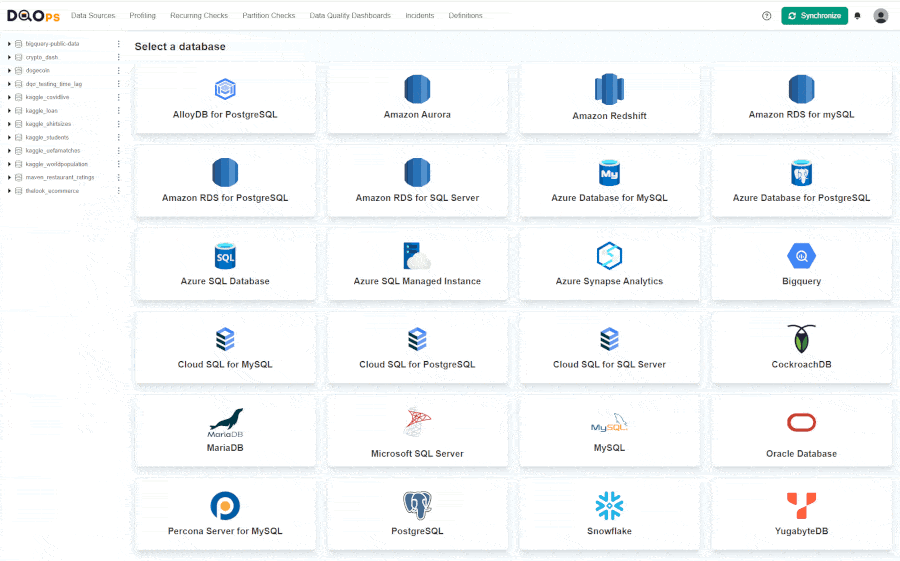DQO Data Quality Operations Center
Project description
DQO Data Quality Operations Center
DQO is an DataOps friendly data quality monitoring platform with customizable data quality checks and data quality dashboards. DQO comes with around 150 predefined data quality checks which helps you monitor the quality of your data.
Key features
- Intuitive graphical interface and access via CLI
- Support of a number of different data sources: BigQuery, Snowflake, PostgreSQL, Redshift, SQL Server and MySQL
- ~600 build-in table and column checks with easy customization
- Table and column-level checks which allows writing your own SQL queries
- Daily and monthly date partition testing
- Data grouping by up to 9 different data grouping levels
- Build-in scheduling
- Calculation of data quality KPIs which can be displayed on multiple built-in data quality dashboards
- Incident analysis
Installation
To use DQO you need:
- Python version 3.8 or greater (for details see Python's documentation and download sites).
- Ability to install Python packages with pip.
- Installed JDK software (version 17) and set the JAVA_HOME environment variable.
DQO is available on PyPi repository.
-
To install DQO via pip manager just run
python -m pip install --user dqopsIf you prefer to work with the source code, just clone our GitHub repository https://github.com/dqops/dqo and run
-
Run dqo app to finalize the installation.
python -m dqops -
Create DQO userhome folder.
After installation, you will be asked whether to initialize the DQO user's home folder in the default location. Type Y to create the folder.
The user's home folder locally stores data such as sensor readouts and the data quality check results, as well as data source configurations. You can learn more about data storage here. -
Login to DQO Cloud.
To use DQO features, such as storing data quality definitions and results in the cloud or data quality dashboards, you must create a DQO cloud account.
After creating a user's home folder, you will be asked whether to log in to the DQO cloud. After typing Y, you will be redirected to https://cloud.dqo.ai/registration, where you can create a new account, use Google single sign-on (SSO) or log in if you already have an account.
During the first registration, a unique identification code (API Key) will be generated and automatically retrieved by DQO application. The API Key is now stored in the configuration file.
-
Open the DQO User Interface Console in your browser by CTRL-clicking on the link displayed on the command line (for example http://localhost:8888) or by copying the link.
Documentation
For full documentation with guides and use cases, visit https://dqops.com/docs/
DQO client
The package contains also a remote DQO client that can connect to a DQO instance and perform all operations supported by the user interface. The DQO client could be used inside data pipelines or data preparation code to verify the quality of tables.
Usage of the DQO client.
from dqops.client import Client
client = Client(base_url="http://localhost:8888")
If the endpoints you're going to hit require authentication, use AuthenticatedClient instead:
from dqops.client import AuthenticatedClient
client = AuthenticatedClient(base_url="http://localhost:8888", token="Your DQO Cloud API Key")
Now call your endpoint and use your models:
from dqops.client.models import MyDataModel
from dqops.client.api.my_tag import get_my_data_model
from dqops.client.types import Response
my_data: MyDataModel = get_my_data_model.sync(client=client)
# or if you need more info (e.g. status_code)
response: Response[MyDataModel] = get_my_data_model.sync_detailed(client=client)
Or do the same thing with an async version:
from dq_ops_client.models import MyDataModel
from dq_ops_client.api.my_tag import get_my_data_model
from dq_ops_client.types import Response
my_data: MyDataModel = await get_my_data_model.asyncio(client=client)
response: Response[MyDataModel] = await get_my_data_model.asyncio_detailed(client=client)
By default, when you're calling an HTTPS API it will attempt to verify that SSL is working correctly. Using certificate verification is highly recommended most of the time, but sometimes you may need to authenticate to a server (especially an internal server) using a custom certificate bundle.
client = AuthenticatedClient(
base_url="https://tenantinstance.dqops.com/",
token="SuperSecretToken",
verify_ssl="/path/to/certificate_bundle.pem",
)
You can also disable certificate validation altogether, but beware that this is a security risk.
client = AuthenticatedClient(
base_url="https://tenantinstance.dqops.com/",
token="SuperSecretToken",
verify_ssl=False
)
There are more settings on the generated Client class which let you control more runtime behavior, check out the docstring on that class for more info.
Things to know:
-
Every path/method combo becomes a Python module with four functions:
sync: Blocking request that returns parsed data (if successful) orNonesync_detailed: Blocking request that always returns aRequest, optionally withparsedset if the request was successful.asyncio: Likesyncbut async instead of blockingasyncio_detailed: Likesync_detailedbut async instead of blocking
-
All path/query params, and bodies become method arguments.
-
If your endpoint had any tags on it, the first tag will be used as a module name for the function (my_tag above)
-
Any endpoint which did not have a tag will be in
dqops.client.api.default
Contact and issues
If you find any issues with the tool, just post it here:
https://github.com/dqops/dqo/issues
or contact us via https://dqops.com/
Project details
Release history Release notifications | RSS feed
Download files
Download the file for your platform. If you're not sure which to choose, learn more about installing packages.
Source Distribution
Built Distribution
Filter files by name, interpreter, ABI, and platform.
If you're not sure about the file name format, learn more about wheel file names.
Copy a direct link to the current filters
File details
Details for the file dqops-0.2.1.tar.gz.
File metadata
- Download URL: dqops-0.2.1.tar.gz
- Upload date:
- Size: 406.0 kB
- Tags: Source
- Uploaded using Trusted Publishing? No
- Uploaded via: twine/4.0.2 CPython/3.11.4
File hashes
| Algorithm | Hash digest | |
|---|---|---|
| SHA256 |
e8f43cf68b2aee3874a2a50fc1ac2add58b4cd58eda395c2173ee72c5caf7ea3
|
|
| MD5 |
0085407e7bb6a323132558c3c4b629e7
|
|
| BLAKE2b-256 |
d35d982772beef3e6df99c252819ad5ec18759aad9472a9150d9585be77c27fc
|
File details
Details for the file dqops-0.2.1-py2.py3-none-any.whl.
File metadata
- Download URL: dqops-0.2.1-py2.py3-none-any.whl
- Upload date:
- Size: 1.5 MB
- Tags: Python 2, Python 3
- Uploaded using Trusted Publishing? No
- Uploaded via: twine/4.0.2 CPython/3.11.4
File hashes
| Algorithm | Hash digest | |
|---|---|---|
| SHA256 |
7065fcaa5f49da001af4685f6f80d8ef8e5f4abcf7a5f707f6894f3a952a54b5
|
|
| MD5 |
4b90181ebbd4d7bb03e8b3ea80789975
|
|
| BLAKE2b-256 |
936a3d65ef370f20fc36f8c8662811a062242c1365528f9b018c4cf84188c57e
|












